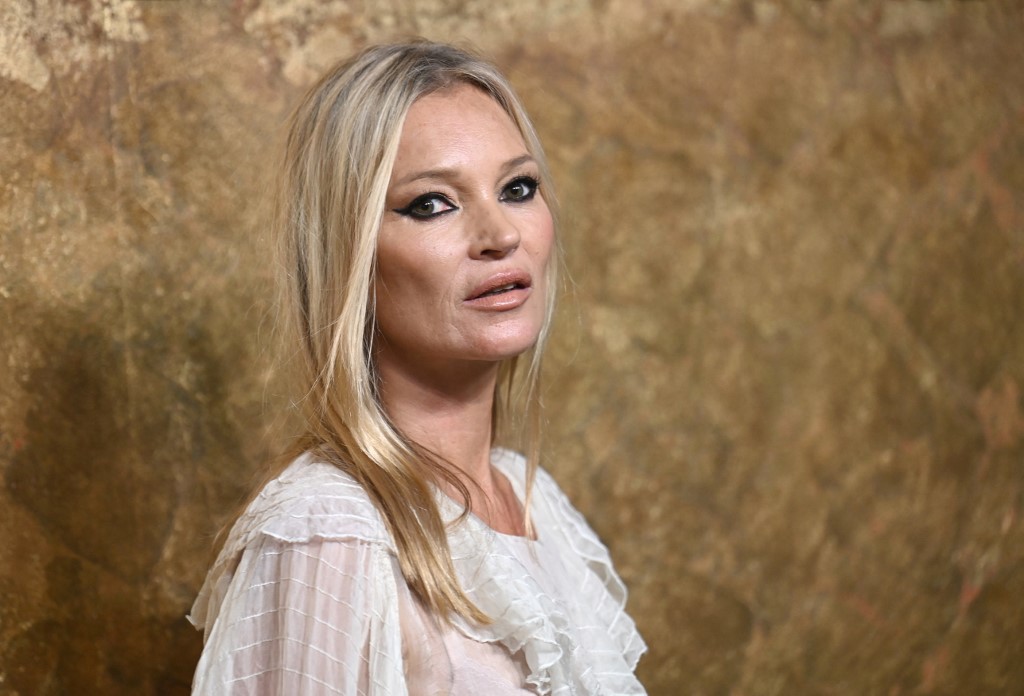British supermodel Kate Moss, whose looks embodied “Cool Britannia” in the 1990s, turns 50 on Tuesday, and still fascinates the country.
In September last year, the catwalk star told The Times newspaper that she was “in denial” about hitting her half-century.
“I’m not turning 50,” she said in an interview. “No, I’m not thinking about it. I do not feel 50.”
Newspapers, however, have taken it upon themselves to remind her, with a slew of articles commemorating her landmark birthday.
The Guardian spoke to photographers behind the most famous images of Moss, who appeared on the cover of hundreds of magazines and major ad campaigns.
“You could not take a bad photo of her,” recalled Kate Garner. “She’s so British.”
“Of all the pictures I’ve taken of celebrities, the ones of Kate just keep selling,” she added.
Moss, who grew up in Croydon, south London, was talent-spotted by a modeling agency at the age of 14.
She hit it big three years later, becoming known for her girlish looks, and for modeling Calvin Klein underwear in suggestive poses.
In 2022, Moss told the BBC she felt “objectified and vulnerable and scared.
“They played on my vulnerability.”
Moss’s slight frame — used in “heroin chic” style campaigns — was in stark contrast to other supermodels such as Cindy Crawford, Claudia Schiffer, and Naomi Campbell.
Golden statue
Fashion brands fought over her and she set trends, helping to popularise the Hunter brand of rubber Wellington boots when she wore them with hotpants at the Glastonbury music festival.
With her well-documented excesses and glamorous life, Moss became a staple of the gossip columns.
Tabloids followed her relationships with Hollywood actor Johnny Depp and Libertines frontman Pete Doherty.
In 2005, Moss was accused of taking cocaine, leading to the loss of contracts. But despite predictions that her career was over, she bounced back and became even more popular.
In 2011, she married The Kills guitarist Jamie Hince but the couple separated five years later.
Beyond fashion, she captivated the painter Lucian Freud, who painted her portrait, and, it was later revealed, inked a tattoo of two tiny swallows on her lower back.
An 18-carat gold statue “Siren”, by sculptor Marc Quinn, depicting Moss in a yoga pose, was shown at the British Museum in 2008.
Quinn called her “a media icon for our age” and “an idealized figure who is more of a cultural hallucination than an actual person of flesh and blood”.
At the National Portrait Gallery in central London, there are eight of Moss.
Since giving up the catwalk, Moss’s life seems less hectic: in The Times interview, she said she now goes to bed early and leaves parties around midnight.
She has launched her own range of beauty and well-being products and says she sometimes goes “moonbathing” — an ayurvedic practice of lying under moonlight to absorb lunar energy.
According to London’s Evening Standard newspaper, which on Friday published a run-down of Moss’s “most iconic birthday parties”, she will celebrate her 50th on the Caribbean island of Mustique.
“There is no bigger poster girl for British party culture,” the newspaper wrote. “Kate was born to party.”
